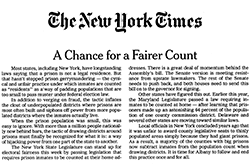The Honolulu Advertiser highlights how the Census Bureau's decision to credit Hawaiian prisoners to mainland prisons hurts the Hawaiian count.
by Peter Wagner,
May 17, 2010
Michael Tsai has a lengthy article in the Honolulu Advertiser that Hawaii prisoners held on Mainland skew census results. I’m quoted, as is Momi Fernandez, director of the Data and Information/Census Information Center at the Native Hawaiian advocacy group Papa Ola Lōkahi.
The article draws some research from the Hawaii section of our 50-state report Fixing prison-based gerrymandering after the 2010 Census.
Close readers of this blog may be surprised by the article’s emphasis on a funding impact from where people in prison are counted. Normally, we argue the Census Bureau’s prison miscount has very little impact on funding. Most federal aid is block grants to states, and most people in prison are incarcerated in their home state. Hawaii is a bit of an exception because it ships so many people to other states, so it does lose some Medicaid and Highway funding.
From my perspective, though, the largest impact is probably the effect on the redistricting process.
Given the concentration of Native Hawaiians in that state’s criminal justice system, accurately counting Hawaii’s prison population is critical for electoral fairness and statistical planning. Because the Census Bureau does not collect the necessary data, I don’t know exactly where the state’s incarcerated people are from and I can’t predict exactly how the prison miscount hurts Native Hawaiians in that state. But I can show the harm caused at the other end of the prison count, as the article explains:
Census reform advocates also argue that large concentrations of prisoners — particularly in the small, rural communities where prisons-for-rent have proliferated in recent years — compromise the integrity of census data and raise threat of gerrymandering during district reapportionment.
In the 2000 census, prisoners from Hawai’i unknowingly played a part in just such a scenario.
According to census data, Native Hawaiians accounted for roughly half of the resident population of Appleton township in Swift County, Minn. — because of a contract between the state of Hawai’i and the Corrections Corporation of America, which operated the district’s Prairie Correctional Facility.
Peter Wagner, founder of the Massachusetts-based Prison Policy Initiative, said counting Hawai’i prisoners as residents of the district surrounding the prison artifically inflated the area’s population profile for redistricting purposes and unfairly weighted the influence of district voters in county governance.




